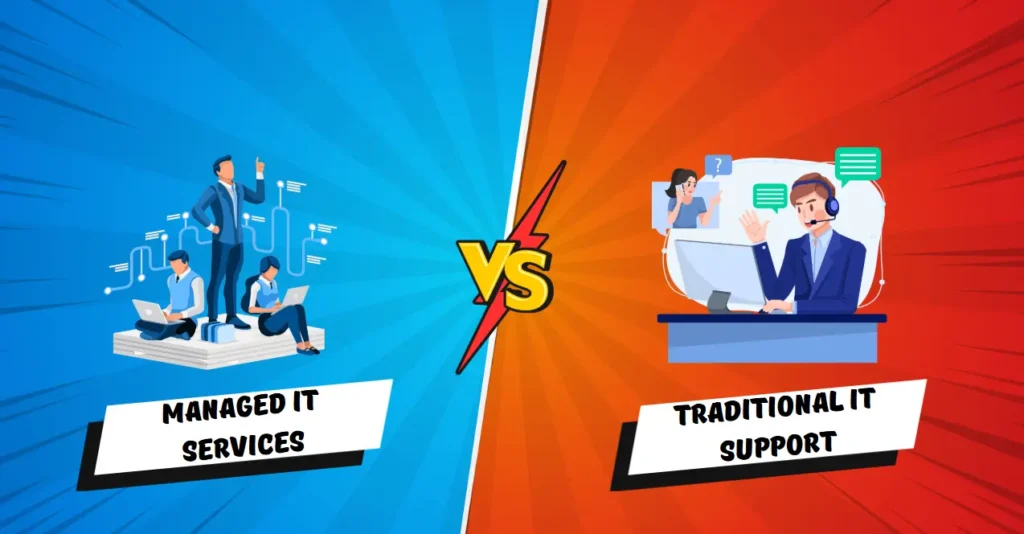What Are Managed IT Services? A Complete Guide
You might wonder, What are managed IT services? You can shift the day-to-day responsibilities of IT functions and processes. With a managed service provider, or MSP, you get just that. These pros handle everything from cloud to cybersecurity and IT strategy to day-to-day monitoring and maintenance. They make sure your systems run smoothly, all day, every day. So, if you’re tired of tech troubles, an MSP might be your new best friend. Check out our detailed guide on the cost of managed IT services in 2025.
Key Takeaways
- MSPs help you focus on your business by handling tech tasks.
- They cover everything from cloud services to managed security services and more.
- MSPs offer proactive solutions, which means fewer tech headaches for you.
- Choosing the right managed service provider boosts your productivity and growth.
- The future of managed services includes more AI and better security.
What are Managed IT Services?
An MSP, or managed services provider, is a third-party company that manages a client’s IT infrastructure and systems. MSPs perform various services, including network and infrastructure management, security and monitoring, application management, and applying operating system updates and patches. You can hire our professionals for managed IT services.
MSPs can also provide hardware, software, or cloud technology. They are a good option for businesses that don’t have the internal resources or need to augment their current resources to support their IT needs. MSPs can offer a predictable cost, benefiting businesses that want to avoid unexpected expenses. MSPs and their clients are usually bound by a contract with a service level agreement that defines the quality metrics and expectations of the services. Read our Premium Guide to hire a professional managed IT services partner.
Why do businesses rely on MSPs?

Businesses rely on managed IT services due to their invaluable expertise. These services cut costs while offering 24/7 support, which is crucial for smooth operations. You benefit from seamless tech management with managed IT service providers, ensuring your business thrives without tech hiccups. MSPs empower growth, letting you focus on core priorities instead.
Types of services offered
Let’s talk about the different offerings in managed services. Remote monitoring and management help prevent issues while managing security safeguards against cyber threats. Cloud services help you work seamlessly anywhere, and backup and disaster recovery give you peace of mind. This ensures your business stays secure and competitive in an evolving tech environment.
How Managed IT services work?
Understanding the workings of managed IT services involves recognizing the role of service providers. They operate under SLAs, which define service scope and performance. Managed IT service providers offer proactive management, ensuring systems remain secure. Through this approach, businesses enjoy optimized IT infrastructure without the hassle. With managed services explained, you can expect seamless operations and expert support.
Evolution of Managed IT Services
The shift in managed IT service offerings reflects their dynamic nature. From merely responding to issues, they now proactively safeguard systems, utilizing advancements like cloud services and managed security services. Your business gets uninterrupted operations without the tech fuss. This evolution in managed IT services emphasizes efficiency, reducing downtime, and boosting performance with cutting-edge solutions. A reliable service provider ensures this.
Benefits of Managed IT Services
Predictable costs and flexibility are key. You’re not just reducing expenses but empowering growth without tech headaches. Managed service providers ensure seamless operations with proactive problem resolution, letting you focus on your business goals. Your business can access advanced tools and scalable expertise the average business can’t get. So, there’s no more juggling IT issues. Cybersecurity is just smooth sailing as your service provider takes the reins.
Types of Managed IT Services
When you ask, “What Are Managed IT Services?” you might think that if it plugs into a wall, it’s covered, right? Cloud services, network services, cybersecurity, the help desk or service desk, software as a service oversight and updates, backup, and disaster recovery are all covered.
More mature managed service providers will also offer vCIO services; their offering will align with a cybersecurity framework, and there will also be ancillary services. Those services would be project management, VoIP, cameras and access control, and general IT consulting services.
Managed IT Services vs Traditional IT Support
Exploring the distinctions between managed IT services and traditional support, you’ll notice proactive versus reactive approaches. Managed IT service experts offer continuous optimization via a service delivery framework, while traditional methods often wait for issues to arise. Managed service providers streamline operations for a fixed fee while saving money, freeing you to focus on your core business.
Using managed service providers will give you significant cost savings, better IT planning and functionality, and better security and adherence to best practices in the long term.
Why Your Business Needs an MSP?

With the dynamic needs of businesses today, tapping into experts who can easily solve or avoid common IT challenges saves you from unpredictable downtime. A team of experts also saves you time and money trying to grow your own team or scale your system up or down quickly.
MSPs can access the latest and greatest tools, allowing your business to leverage the best technology available. This will allow you to enhance your team’s efficiency and productivity while focusing on growth and innovation.
Choosing the Right Managed Service Provider
Finding the perfect fit among IT partners might feel like a needle in a haystack. Evaluate your IT requirements and their track record meticulously. We have an eBook that will allow you to ask the right questions of anyone you’re interviewing. There won’t be an apples-to-apples comparison of money or services offered. So be sure you like the people. That’s who you’re doing business with.
Future of Managed Services
Addressing the trajectory of managed IT service, you’re looking at more AI integration and automation. MSPs focus more on cybersecurity and mitigating your risk than on fixing IT issues. The further expansion of cloud services and governance risk and compliance services as the government forces businesses to do their due diligence.
Conclusion
MSPs are reshaping how businesses handle technology. They offer a strategic way to manage IT tasks without the hassle. Outsourcing experts can help you focus on what you do best. No more worrying about system crashes or data breaches. Managed services cover it all, from security to cloud management and even reviewing your IT strategy with you and helping set the right course for your business.
FAQs
- What exactly are managed IT services?
Managed IT services mean outsourcing your IT tasks to a third-party provider. These tasks can include network management, cybersecurity, and cloud services. The goal is to let you focus on your core business.
- How do managed IT services differ from traditional IT support?
Traditional IT support is often reactive, fixing issues as they arise. Managed IT services are proactive, preventing problems before they occur. It’s like having a security guard instead of a repairman.
- Why should my business consider managed IT services?
Managed IT services can save you money and reduce stress. You get access to expert knowledge without needing a large IT team. Plus, you benefit from 24/7 monitoring and support.
- Can a managed service provider integrate with existing IT teams?
YES! If the MSP and internal team have specific roles and responsibilities.
- What is the future of managed IT services?
Expect more integration with artificial intelligence and improved cybersecurity. Services will become more personalized, adapting to your business’s changing needs.





